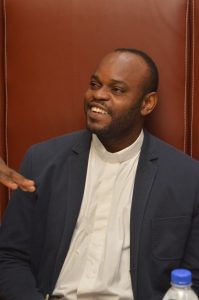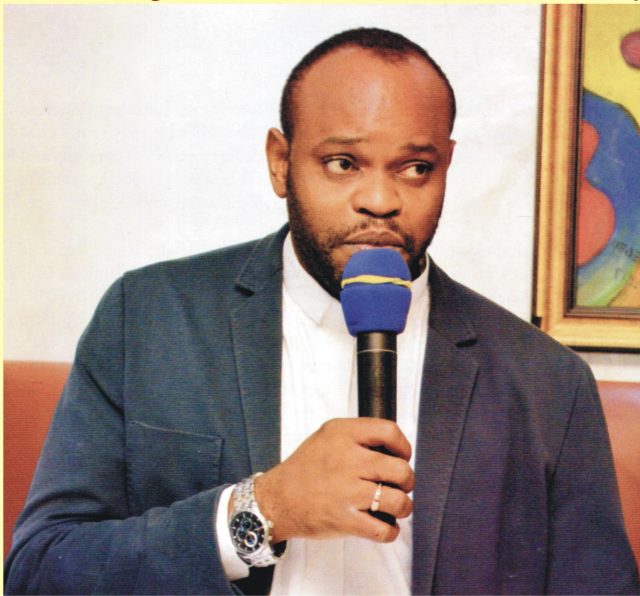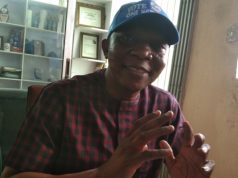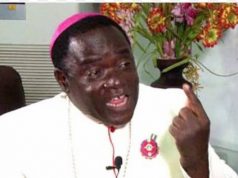“If ‘One Nigeria’ would be possible, we must rise above the limitations of our various religious and cultural affiliations to see reality for what it is: One People.”
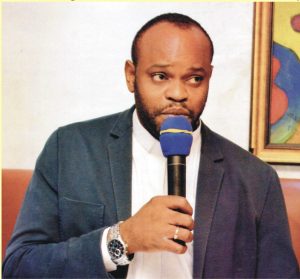
It is an unequivocal fact that the present administration of APC under President Muhammadu Buhari has only succeeded in inflicting pains, agony, frustration, bloodbath and poverty on majority of Nigerians. Bothered by these and more, I booked for an interview with one of the greatest young intellectual authorities on the sand of this nation. Prof Kanu, Ikechukwu Anthony, OSA is a Professor of Religion at Tansian University, Nigeria. He is the President, Association for the promotion of African studies and humanities. The prolific writer and perspicacious orator is the Editor-in-Chief of IGWEBUIKEPEDIA: an internet Encyclopedia of African Philosophy. Rev. Fr. Prof. KANU Ikechukwu Anthony, O.S.A., is a priest of the Order of Saint Augustine, of the Province of Saint Augustine of Nigeria. He is the Parish Priest of Saint Vincent Catholic Church Satellite Town, Catholic Archdiocese of Lagos. In an exclusive interview with this rare intellect, he bemoaned the high level of insensitivity of the present administration and charged them to wake of from their slumber. THE EXCERPT:
Do you think that the Nigeria Government is doing enough to secure lives and property?
It is very obvious to everyone that the ability of the present government when it comes to responding to crisis and preventing its future occurrence using armed forces and law enforcement agents needs to be questioned. The phrase: “They perpetrators will be brought to book” is one that we hear all the time without a corresponding action. It has actually lost its meaning. Mass burial and condolence messages seem to be the major action of crisis control. The result of this disposition is that impunity is encouraged and thus, insecurity across the country is fueled. Just this year alone, about 1800 lives have been lost so far. In Plateau state, on 23rd June, herdsmen were said to have attacked 11 villages, an operation that lasted for at least seven hours and killed not less than 200 villagers without the intervention of the security forces, is very ridiculous. Ours is a government that seems to have forgotten that her primary responsibility of protecting lives and property. There are lots of questions in the minds of many Nigerians. Questions like: Who are these gunmen? Where do they come from? Where do they go after the attacks? Who funds their impunities? Why is the security forces’ response very late? After the local people are conquered, why does the government watch the land of the local people occupied without a word?
The terrorist attacks seem to mostly befall Christians what is your view on that?
Apart from Ekiti, Adamawa, Benue, Taraba, Kogi, Ebonyi, Edo, Delta, Ekiti, Oyo, Ondo, etc., where a good number of Christians have been affected by terrorists, we also have cases of attacks in Sokoto, Zamfara, Yobe, Borno, and in these places a huge population of Muslims are affected. It might not be entirely correct to hold this view, even though recent happenings do insinuate it.
What is your message of hope to the Christians who are persecuted?
Although the martyrdom experienced brings pain and discouragement, my word to Christians is to stand on their faith. The blood currently being shed will not be in vain. It was Tertullian that said in his most famous work Apologeticus that: “the blood of the martyrs is the seed of the Church”. Let us take solace in the words of Saint Paul: “We are pressed on all sides, but not crushed; perplexed, but not in despair; persecuted, but not forsaken; struck down, but not destroyed. We always carry around in our body the death of Jesus, so that the life of Jesus may also be revealed in our body. For we who are alive are always consigned to death for Jesus’ sake, so that the life of Jesus may also be revealed in our mortal bodies” (2 Cor. 4:8-11).
Advice to Nigerians on how to choose their leaders come 2019?
There is an African proverb that says: “You don’t tell a blind man that rain is falling”. What Nigerians want in the next four years, counting from 2019 should determine who they should vote. If they are contented with what is happening now, and if this is the Nigeria of their dream, then they should vote the incumbent government. But if they feel unhappy about the present situation of things and have a vision of going higher, then they must choose a leader who would take them to where they want to be. At the moment, Nigeria seems to have lost her dignity in the community of nations. Everywhere you travel to, the first question that people ask you is about Boko Haram and Fulani Herdsmen. That is what most people in the world know about Nigeria at the moment. This is not where we should be.
Do you advise Christians to pick up weapons in self-defense?
In a situation of this kind, the question to be asked is: what does the law of the Nation say about self-defense? Within the very letters of our constitution particularly, Sections 33 and 34, we find some pointers to the direction we must take as a country over this senseless killings.
The said section provides and I quote verbatim, “The right to Life (and the) Right to dignity of the human person.” This right is immutable and it’s context demand that the State of Nigeria has a duty to enforce this right no more legitimately than a Nigerian has the implied right to see that this right is respected and protected. To be crystal clear, Section 59 of the Penal Code on the other hand reads as follows: “Nothing is an offence of which is done in the lawful exercise of the right of private defense.” The Criminal Code in section 32 (3) provides, inter alia: “A person is not criminally responsible for an act or omission if he does or omits to do the act… when the act is reasonably necessary in order to resist actual and unlawful violence threatened to him or to another person in his presence.”
Do you think that CAN has done enough to defend her subjects especially now that the killing of Christians has increased?
CAN as a human institution has done her best not minding the weaknesses here and there. She has spoken for Christians in Nigeria on many occasions. As regards the recent killing of Christians, CAN is not a military body to go and fight in defense of Christians. She has always condemned these killings. However, she needs to do more.
Do you think that the youths are lazy and useless as the President pointed out recently?
First of all, I would like to say that President Muhamadu Buhari did not say that Nigerian youths are “lazy and useless”. This statement attributed to him is more of an interpretation of what he said on that day. If I heard him well on that day, he rather said: “We have a very young population. Our population is estimated conservatively to be about 180 million. This is a conservative one. More than 60% of the population is below the age of 30. A lot of them having been to school, and they are claiming that Nigeria has been an oil producing country therefore they should sit and do nothing, get housing, healthcare, education, free”. Even though he didn’t say that all Nigerians youths are lazy and useless, this was not the words Nigerians were expecting from their leader in an international platform of that kind. There are lazy people everywhere, even in the most developed part of the world. It is not the prerogative of Nigerian youths. Governments all over the world are put in place to institute structures that reduces negative human negative tendencies to the barest minimum. And this is where our government has failed.
Nigerian youths are not lazy and useless. If you are to go to Onitsha and Aba and see how young Nigerians are huzzling, or even here in Lagos, when you go to Berger, Trade fair, Balogun and Idumota markets and see how young men and women are struggling to make ends meet in spite of the Nigerian in-conducive economic and political structures, it would be insensitive to say, collectively that they are lazy. A lot of them are in the movie industry, even in the farms in Northern Nigeria working hard. A government that should such a statement against her young should be one that has fulfilled all her responsibilities towards the young. 
What is your advice to the youths?
I will begin by asking the young people the very question that Martin Luther King Jr., asked a group of young people in Philadelphia many years ago: “What is in your life’s blueprint?” What you have in your life’s blue print will determine how far you will go and what you shall become in the future. There is an African adage that says: The wood you collect during dry season, is what you will use during raining season. The quality of your blueprint would determine how solid your life would be in the future. This question is very fundamental for every young person because the age of youth is the most important period in the life of a person. It is a time when the foundation of life is laid. If it is laid properly, life goes well, laid wrongly, the whole of life is lived in pain and regret. William Shakespeare said that: “There is a tide in the affairs of men, taken on the crest leads on to fortune, omitted, all the journeys of life are bound to end in sorrows and miseries.”
The first element that every young person should have in his blueprint is a deep believe in his or her ‘somebodiness’. To succeed, you need to believe that your life has worth or ultimate significance. Secondly, there must be the determination to achieve excellence. Believing in your ‘somebodiness’ without a corresponding determination to achieve something out of life doesn’t lead to success. In spite of the frustrating economic and socio-political factors that surround us, we must be determined: remain on the track and never give up. Thirdly, whatever you do, do it well, and be the best of whatever that you are. If you can’t be a tree, be a bush; if you can’t be a highway be a pathway; if you can’t be a river be a stream; if you can’t be a sea be a river, and if you can’t be an ocean be a sea. If you cannot fly, run, if you cannot run walk, if you cannot walk crawl- by all means keep moving. Fourthly, let us hold on to the eternal principles of beauty and love. Let us not allow ourselves to descend so low to the point of hatred, or being used as mercenaries by the political class.
Prof. do you think that we can still achieve one Nigeria as dreamt by the Founding fathers?
Our founding fathers that called for one Nigeria had a particular mentality. It was this mentality, this state of mind that was able to capture the lofty idea of ‘One Nigeria’. If we want that dream to be realized, then we may have to begin to think or reason like them. You can’t be talking about ‘One Nigeria’ when different parts of the country are aggrieved, feel betrayed, marginalized and oppressed. ‘One Nigeria’ will be possible when we are able to accent to the eternal principle of justice.
There is a socio-political philosophy behind the dream of ‘One Nigeria’. It is the philosophy that understands life as a shared reality, and that it is only within the context of complementarity that life makes meaning. One Nigeria is a life of sharedness; one in which another is part thereof. A relationship, though of separate and separated entities or individuals but with a joining of the same whole; a relationship in which case the two or more coming together make each of them a complete whole; it is a diversity of being one with each other. To put the other away or kill the other removes the balance of being ‘One Nigeria’.
We all have a missing part in ourselves and are at the same time a missing part of the other. If the other is my part or a piece of me, it means that I need him for me to be complete, for me to be what I really want to be. The other completes rather than diminishes me. His language and culture make my own stand out and at the same time, they enrich and complement my own. In the presence of his language and culture, the riches and poverty of my language and culture become clear and I see that his own and my own when put together form a richer whole when compared to any of them in isolation. Nigeria is not the only nation where there are Muslims and Christians. Nigeria is not the only nation where there are herdsmen. Nigeria is not the only nation where people of different ethnic groups live together and yet Nigeria is the place where diversity has become a source of crisis. If ‘One Nigeria’ would be possible, we must rise above the limitations of our various religious and cultural affiliations to see reality for what it is: One People.
